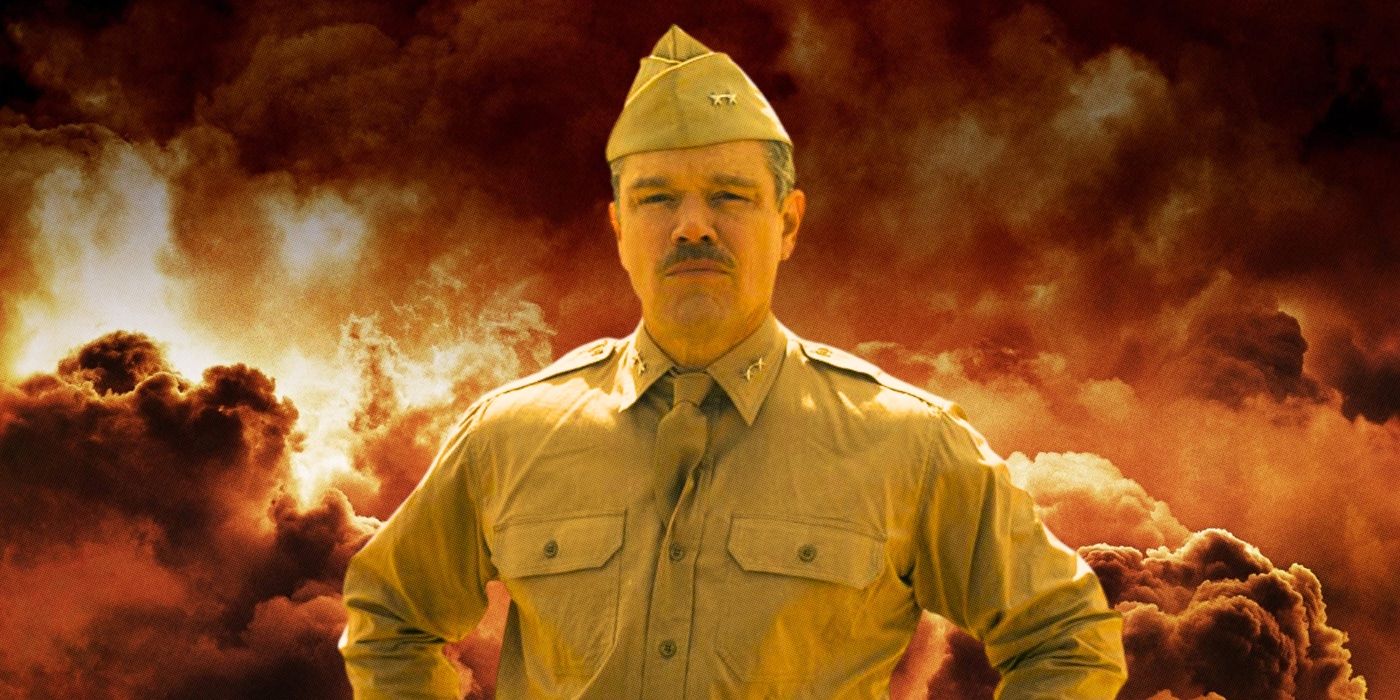The Big Picture
- Cillian Murphy shines in Oppenheimer, but Matt Damon's portrayal of General Groves adds depth to the film's complex themes.
- Groves and Oppenheimer's relationship is central, revealing tensions between loyalty and government paranoia.
- Matt Damon's against-type role as Groves showcases the impact of Communist fears on loyalty and duty in a gripping manner.
Oppenheimer is dominated by Cillian Murphy’s masterful performance as J. Robert Oppenheimer, with Emily Blunt and Robert Downey Jr. also doing outstanding work in the major roles of Oppenheimer’s wife, Kitty, and political rival, Lewis Strauss, respectively. But while the impressions left by these three loom largest, the film also features an extensive cast of supporting characters, without whom it would not be nearly as effective or comprehensive a story. The most crucial and fully developed of these secondary characters is General Leslie Groves, who is played in a vibrant and commanding manner by Matt Damon. Groves plays a central role in the plot and the against-type casting of Damon makes the character a dynamic and intriguing part of the film who exemplifies many of its main themes.

Oppenheimer
The story of American scientist, J. Robert Oppenheimer, and his role in the development of the atomic bomb.
- Release Date
- July 21, 2023
- Director
- Christopher Nolan
- Cast
- Cillian Murphy , Matt Damon , Robert Downey Jr. , Emily Blunt , Alden Ehrenreich , Scott Grimes , Jason Clarke , Tony Goldwyn
- Runtime
- 180 minutes
- Main Genre
- Biography
- Writers
- Kai Bird , Christopher Nolan , Martin J. Sherwin
- Studio
- Universal Pictures
Who Was General Groves in 'Oppenheimer'?
General Leslie Groves was the U.S. Army General in charge of the Manhattan Project during World War II. In 1942, he recruited Oppenheimer to lead the effort to create the atomic bomb, despite knowing about Oppenheimer’s associations with left-wing political groups including the Communist Party, which likely would have stopped other military officers from recruiting him. The film depicts the two men’s working relationship as complex. They clearly had tremendous amounts of respect for one another and were united in their determination to develop a bomb before Nazi Germany. Groves is also shown making efforts to insulate Oppenheimer from unnecessary bureaucracy and the suspicion other government officials have about him.
That said, the pair did clash on certain issues, such as Oppenheimer’s desire to bring his brother Frank (Dylan Arnold), a former Communist, onto the project and the need for compartmentalization, which many of the scientists felt made their jobs more difficult, although Oppenheimer ultimately abided by the military’s policies more faithfully than many of his peers. Oppenheimer also suspected that Groves may have recruited him specifically because of his left-wing background as this would make him easier to manipulate.
Matt Damon's General Groves Is One of 'Oppenheimer's Best Characters
Matt Damon’s performance and Oppenheimer’s writing work in concert to make General Leslie Groves a nuanced and compelling character. A point is made to mention Groves’ extensive educational background so that the viewer sees him as an intellectual equal to most of the scientists. He is characterized as a no-nonsense, sometimes intimidating figure. The disrespect and disobedience many of the scientists other than Oppenheimer show him earns him a degree of sympathy from the viewer, but his ruthlessness also makes him somewhat frightening at points.
When one scientist quits because of his frustration with the compartmentalization, Oppenheimer asks Groves if he is concerned that the man will leak details of the secret project to the public. Groves states that he would have him killed before he could do so. After saying this, he smiles and laughs, suggesting that he may have been joking, although it remains unclear if he really was or not. The viewer certainly believes he may have been capable of committing the deed if he believed it was in America’s best interest for him to do so. Groves’ ruthlessness is again demonstrated when he remains adamant that the U.S. must drop not one but two atomic bombs on Japan, despite Oppenheimer and others’ reluctance to actually use the weapons.
Why Is General Groves an Unusual Matt Damon Role?
Playing Groves is something of a departure for Matt Damon. The A-list star has an image as one of the friendliest celebrities in Hollywood, and he usually plays more plainly likable characters. Some of his most famous roles include the title characters in Saving Private Ryan, who refuses to abandon his fellow soldiers despite the deaths of his brothers, and Good Will Hunting, a troubled but brilliant and lovable young man who the viewer wants to see succeed and overcome his demons. The assassin Jason Bourne, was ruthless at one point in his life, but throughout much of the four films Damon played him in, he was filled with remorse and sought justice. Even in The Departed, in which he played a corrupt police officer working for vicious mobster Frank Costello (Jack Nicholson), his charming personality and sense of humor made the viewer invest in him, to the point where some may have been rooting for the character to get away with his crimes. But the viewer’s preexisting investment in and affection for the actor actually helps Groves’ role in Oppenheimer achieve its desired effect.
One of the main ideas in the film is how paranoia about Communism and other left-wing ideologies turned the government against Oppenheimer, with and without the aid of Strauss’ manipulations. The hearing to determine whether Oppenheimer will keep his security clearance also explored the theme of personal loyalty. Many of his colleagues are given little choice but to testify in ways that damage his case for fear of damage to their own reputations and careers, while others choose to do so as payback for slights, real or imagined, they believe Oppenheimer committed against them. Groves’ testimony is the most obviously conflicted, but for different reasons.

Christopher Nolan’s Characters of Science and Destruction: All Roads Lead to ‘Oppenheimer’
Christopher Nolan's 'Oppenheimer' looks at the destructive consequences of great scientific minds - just like his other movies.There’s little threat that the general will himself be labeled a Communist but his dedication to following government regulations closely contrasts with his loyalty to Oppenheimer. Roger Robb (Jason Clarke) asks Groves if, under updated guidelines, he would still choose to hire Oppenheimer despite his knowledge of his left-wing past. Because of the viewer’s assumed prior exposure to Damon as a performer and the investment in Groves and Oppenheimer’s relationship the rest of the film has earned, one wants him to testify in a way that supports Oppenheimer. Unfortunately, he does admit that under the new guidelines, he would not hire Oppenheimer. But he then elaborates that he probably wouldn’t have hired any of the Manhattan Project scientists under said guidelines.
Groves’ testimony is a crucial part of the film that encapsulates many of its themes, and it works as well as it does because of how well-established Groves is as a character at this point. It shows the devastating influence of paranoia on government, as the new, Communist-fearing guidelines force the by-the-book Groves to testify against his respected colleague, which is extra devastating to movie lovers who hate to see a Matt Damon character take on an antagonistic role. However, Groves’ second statement points out the ridiculousness of the guidelines by implying that they would have made it difficult, maybe even impossible, for the bomb to be completed as needed during World War II. This act of defiance, like Strauss’ eventual failure to be confirmed as Secretary of Commerce, is one of the few notes of optimism in the mostly bleak ending of the film, a welcome reminder that not everyone can be corrupted by popular fears.
Oppenheimer is currently available to stream on Peacock in the U.S.

